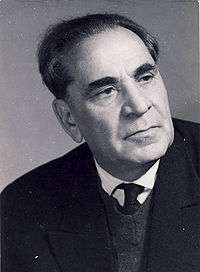Constantin Daicoviciu
Constantin Daicoviciu (Romanian pronunciation: [konstanˈtin ˈdajkovit͡ʃju]; March 1, 1898, Căvăran – May 27, 1973, Cluj-Napoca) was a Romanian historian and archaeologist.
Constantin Daicoviciu | |
|---|---|
 | |
| Born | March 1, 1898 Căvăran |
| Died | May 27, 1973 (aged 75) Cluj |
| Occupation | historian, archaeologist |
During the dictatorship of the Iron Guard he was dean of the philology department of the Sibiu University. (Lavinia Betea, "Partea lor de adevar", 64)
During Communist Romania, he was rector (president) of Babeş-Bolyai University of Cluj, and a member of the Romanian Academy. He was the main representative of the Daco-Romanian continuity theory that has been actively promoted in Communist Romania as the accepted ethnogenesis theory of the Romanian nation. Before his death, in his political testament, however, Daicoviciu withdrew his theses, calling his theory (by the time adopted by the state in education) only hypothetical:[1][2]
- The Daco-Romanian continuity theory is only hypothetical: using it for political goals is – a crime.
His life work is, however, still taught in the Romanian education system and is still promoted by the highest levels of politicians and ministers in Romania.
His son, Hadrian Daicoviciu (1932–1984) was also a historian.
Since his death in 1973, the commune in the Banat where he was born in bears his name.
Book
- Emil Condurachi, Constantin Daicoviciu, The Ancient Civilization of Romania, London: Barrie & Jenkins, 1971. 250 pp. ISBN 0-214-65256-4
References
- A 62-ek levele: 62 romániai magyar értelmiségi levele román értelmiségiekhez, 1978. máj. 25.
- Király Ibolya, 62 romániai magyar értelmiségi levele román értelmiségiekhez, 1978. máj. 25.